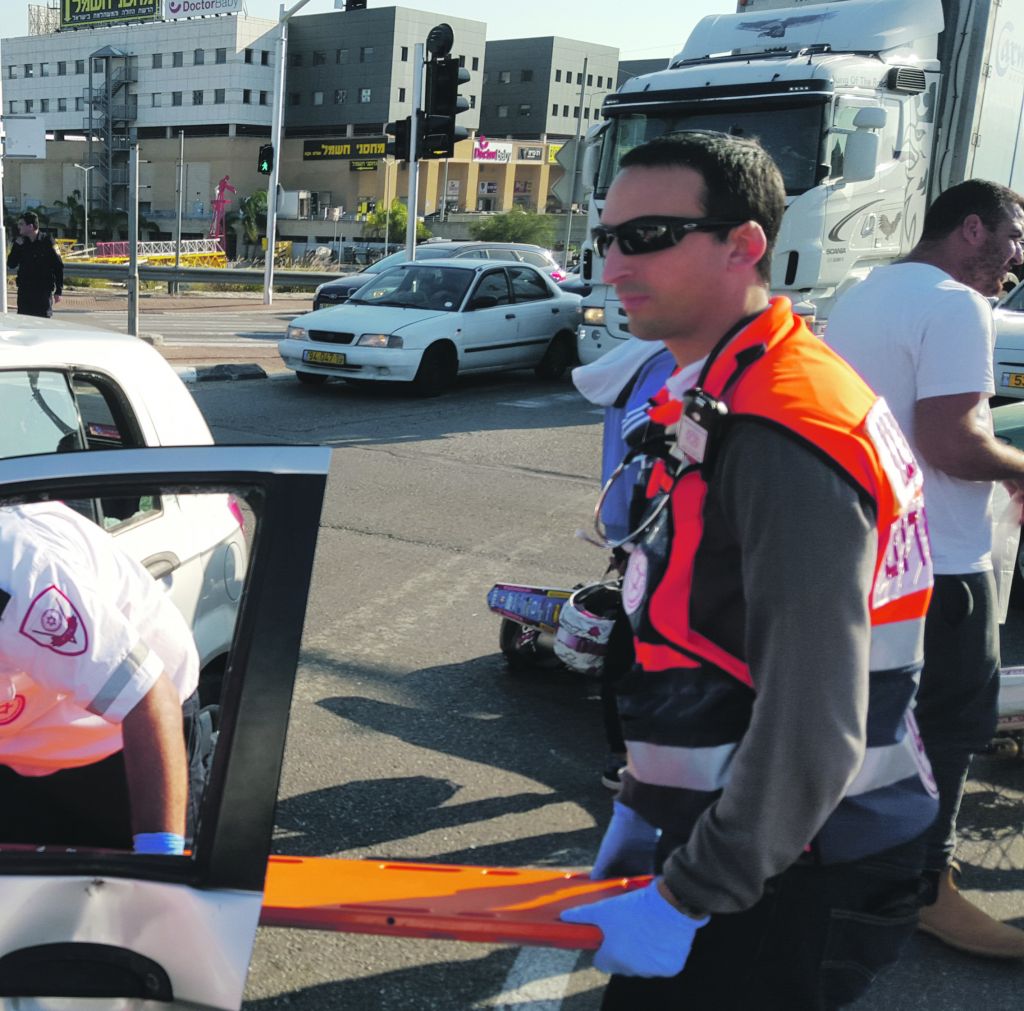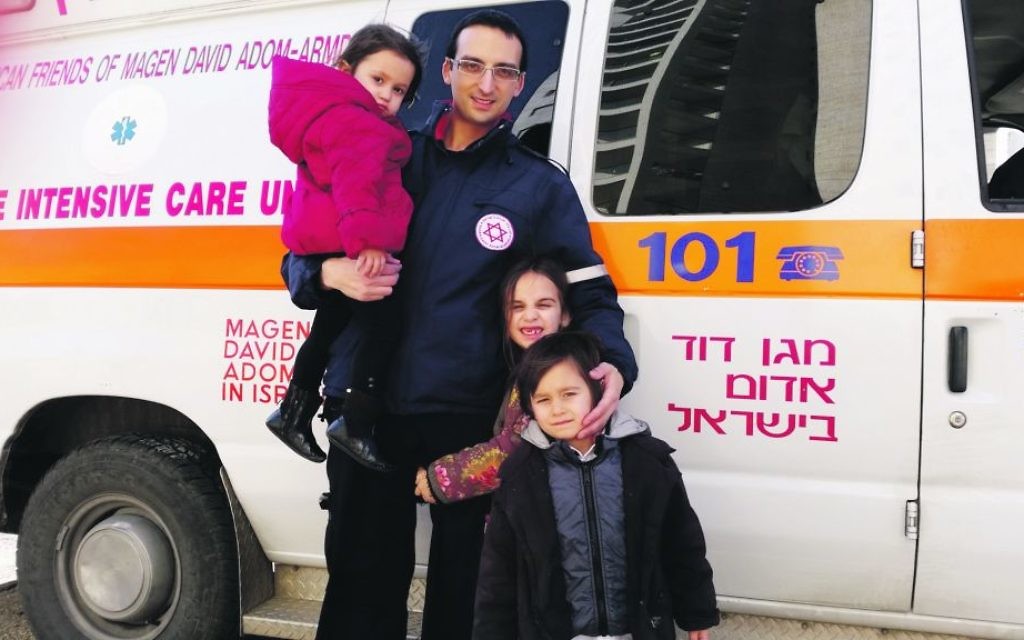Meet the family who put heart and soul into Magen David Adom
Lisa Sanders talks to a couple who met as MDA volunteers and whose lives are still shaped by Israel’s fast-moving national emergency service
Sonia and Nathan Levy met through the overseas training programme of Israel’s emergency medical service Magen David Adom, which has been running for more than 25 years. Both were on a gap year after university and were keen to go to Israel to learn paramedic skills. Their experience was life-changing.
“We were working eight-hour shifts and slept at the ambulance station,” Sonia explains. “Nathan liked doing 24-hour shifts. We got together during this time.”
At the end of their volunteer period, life separated them again. Nathan returned to his home in Lille, northern France. Sonia, who grew up in London with both French and English spoken at home, went back to Paris.
Get The Jewish News Daily Edition by email and never miss our top stories Free Sign Up
Then eventually they found themselves living and working in London. Nathan was volunteering with the British Red Cross. Sonia had qualified as a physiotherapist.
They married in 2007 and lived in Brussels for two years. Each time they visited Israel on holiday they did a few shifts back at the Netanya MDA station. Finally, in 2009, they made aliyah. By this time they also had two small children, Elia, now nine, and Gadi, seven.
Despite the pressures of learning the language, setting up a new business and the demands of his growing family, Nathan was determined to become a fully-fledged emergency responder.
Sonia says: “It’s tough to get a licence to drive an ambulance. It gave Nathan fluent Hebrew; to drive, you are responsible and you have to understand the radio.”

Eight years on, Nathan is one of more than 10,000 people who volunteer for MDA throughout Israel. When someone calls 101 (the Israeli equivalent of 999, which goes straight through to MDA) a beep is sent to the nearest 20 MDA volunteers in the area.
“It’s tough to get a licence to drive an ambulance. It gave Nathan fluent Hebrew; to drive, you are responsible and you have to understand the radio.”
On the Levys’ quiet street, especially on Shabbat, you can often spot the MDA ambulance parked outside but waiting to go at a moment’s notice. Nathan carries the beeper with him all the time – literally.
“You can be in the middle of kiddush,” he says, “at work, or sleeping, and within a few seconds you need to get up to concentrate and go. This is what I like, the ability to analyse, decide and react quickly.”
The Levy family now have four children, including baby Lehava. While Sonia is no longer active as an MDA volunteer, it’s clear the entire family is engaged in the mission of saving lives.
“When he has the ambulance, he has to go out on a call,” Sonia says. “We can be about to put the kids to bed, or in the middle of seder, and the beeper will go off. The kids know what to do when it does. They call the lift, and they read out what it says on the beeper screen. They know what he needs to get him out the door as quick as possible.”
Nathan adds: “When the beeper goes off, I check if I’m close. I’m thinking – okay, where is it? What is it – you know, when it’s serious stuff: kids, a serious accident, asthma, a heart attack. Everything is ready. I know where my keys are, where my shoes are, my clothes. If it’s in the night I know exactly what I’m going to do,” he says. “Every second counts.”
“We were in a restaurant,” Sonia recalls, “and he got a call and went. I was sitting by myself. And he came back about 40 minutes later and said he’d stopped a child choking. He was there 15 minutes before the ambulance.”
“…the beeper will go off. The kids know what to do when it does. They call the lift, and they read out what it says on the beeper screen. They know what he needs to get him out the door as quick as possible…”
If this would be simply too much for most families, the Levys are simply not like most families. To celebrate their wedding anniversary, Sonia’s parents organised donations through MDA UK and bought a defibrillator, which Nathan keeps in his car.
I ask him which cases stand out, given the hundreds of emergencies he’s attended. “Once I received a call from a guy who had collapsed with a heart attack in my street, in his flat. I ran like crazy, we started CPR and the pulse came back and his blood pressure was stabilised, so it was good.
“Then two or three years ago, on Simchat Torah, someone collapsed. The people called us and they said he’d fainted. But it was a heart attack. And we came very fast. There were people dancing with the Torah and we were performing CPR.
“We brought back the pulse and we took him to the hospital but unfortunately he died a few hours after that. He was just 45 years old. If it had been identified as a heart attack, we could probably have saved his life.”
I ask him whether all this adrenalin doesn’t take its toll. “It’s hard for him to fall asleep afterwards,” Sonia admits. “He does tell me about the things he’s seen.”
Nathan adds: “It’s being part of something where you really help people, and you feel useful. And for me this is doing something which is instead of the army. If there’s a war or something they call us and we work 24 hours a day.” During Operation Protective Edge, in 2014, he was deployed to the Gaza border.
Nathan says: “The best thing is the sense of satisfaction about what we do. We’re a very close team. MDA is very much like a family.
“You can be in the middle of something else and all of a sudden you have to concentrate all your efforts to make sure you’re able to save a life.”

Thank you for helping to make Jewish News the leading source of news and opinion for the UK Jewish community. Today we're asking for your invaluable help to continue putting our community first in everything we do.
For as little as £5 a month you can help sustain the vital work we do in celebrating and standing up for Jewish life in Britain.
Jewish News holds our community together and keeps us connected. Like a synagogue, it’s where people turn to feel part of something bigger. It also proudly shows the rest of Britain the vibrancy and rich culture of modern Jewish life.
You can make a quick and easy one-off or monthly contribution of £5, £10, £20 or any other sum you’re comfortable with.
100% of your donation will help us continue celebrating our community, in all its dynamic diversity...
Engaging
Being a community platform means so much more than producing a newspaper and website. One of our proudest roles is media partnering with our invaluable charities to amplify the outstanding work they do to help us all.
Celebrating
There’s no shortage of oys in the world but Jewish News takes every opportunity to celebrate the joys too, through projects like Night of Heroes, 40 Under 40 and other compelling countdowns that make the community kvell with pride.
Pioneering
In the first collaboration between media outlets from different faiths, Jewish News worked with British Muslim TV and Church Times to produce a list of young activists leading the way on interfaith understanding.
Campaigning
Royal Mail issued a stamp honouring Holocaust hero Sir Nicholas Winton after a Jewish News campaign attracted more than 100,000 backers. Jewish Newsalso produces special editions of the paper highlighting pressing issues including mental health and Holocaust remembrance.
Easy access
In an age when news is readily accessible, Jewish News provides high-quality content free online and offline, removing any financial barriers to connecting people.
Voice of our community to wider society
The Jewish News team regularly appears on TV, radio and on the pages of the national press to comment on stories about the Jewish community. Easy access to the paper on the streets of London also means Jewish News provides an invaluable window into the community for the country at large.
We hope you agree all this is worth preserving.
-
By Laurent Vaughan - Senior Associate (Bishop & Sewell Solicitors)
-
By Laurent Vaughan - Senior Associate (Bishop & Sewell Solicitors)
-
By Laurent Vaughan - Senior Associate (Bishop & Sewell Solicitors)
-
By Laurent Vaughan - Senior Associate (Bishop & Sewell Solicitors)






















